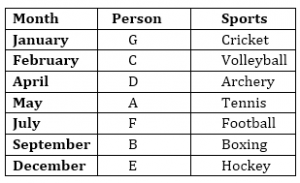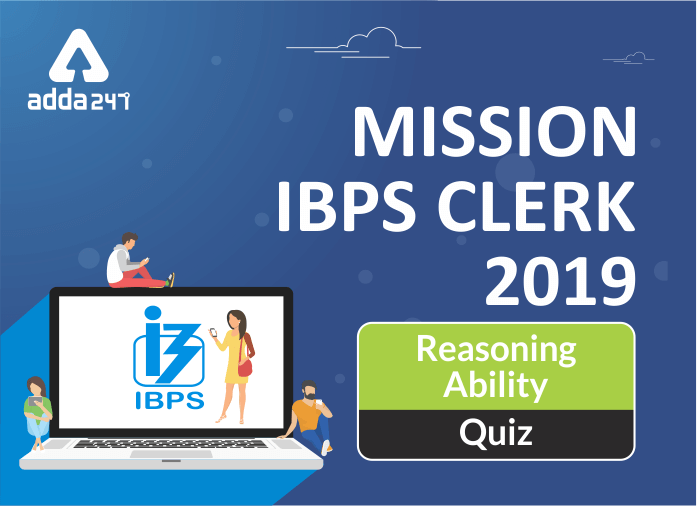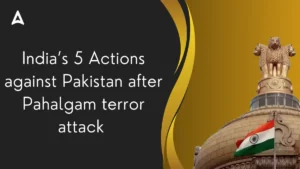Table of Contents
The reasoning being the scoring part can enhance your performance as a whole. All you need to do is clear your basics and be aware of the syllabus of the particular exam you are preparing for. Giving mocks and Quizzes on a regular basis will help you to decode the strategy. Also, the Study Plans go hand in hand with the exam preparations that will take place in the upcoming months. Like the IBPS Clerk Prelims are scheduled in the month of December and we already rolled the study plan for IBPS Clerk. Under the same plan, here is the Quiz for Reasoning, to make sure that you don’t skip any important topic as well as be prepared to face any type of questions in the prelims. IBPS Clerk Reasoning Quiz of 21st November 2019.
Directions (1-5): Study the following information carefully and answer the questions given below:
Seven persons will appear for a exam, in seven different months (of the same year) namely January, February, April, May, July, September and December. Each of them likes different Sports. A does not like Archery. D will appear for an exam in a month which has only 30 days. Only one person will appear between the one who likes Football and D. The one who likes Tennis will appear for an exam immediately before the one who likes Football. The one who likes Volleyball will appear for an exam neither in the month which has 31 days nor in the month which has 30 days. Only two persons will appear for an exam between the one who likes Volleyball and F. G will appear for an exam immediately before C. E likes Hockey and appear for exam in December. The one who likes Cricket will appear for an exam in a month which has 31 days. D does not like Boxing. B will appear for an exam immediately after F and does not likes Tennis.
Q1. A likes which of the following sports?
(a) Hockey
(b) Cricket
(c) Tennis
(d) Boxing
(e) None of these
Q2. Who among the following person appears exam in September?
(a) The one who likes Tennis
(b) F
(c) D
(d) the one who likes Boxing
(e) None of these
Q3. Who among the following likes Archery?
(a) D
(b) B
(c) E
(d) G
(e) None of these
Q4. Which of the following statement is true about G?
(a) G appears exam after D
(b) G likes Tennis
(c) Only two persons are appearing exam between E and G
(d) G appears exam in January
(e) None is true
Q5. D appears exam in which of the following month?
(a) January
(b) April
(c) May
(d) July
(e) None of these
Directions (6-10): In these questions, relationships between elements are shown in the statements. These statements are followed by two conclusions. Give answer-
(a) If only conclusion I follows.
(b) If only conclusion II follows.
(c) If either conclusion I or conclusion II follows.
(d) If neither conclusion I nor conclusion II follows.
(e) If both conclusions I and II follow.
Q6. Statements: G≤F=L≤J; J≤K=H
Conclusions: I. H=G II. G<H
Q7. Statements: P<R≤S<T>U≥Q>W
Conclusions: I. W>S II. T>P
Q8. Statements: T>U≥V≥W; X<Y=W>Z
Conclusions: I. Z>U II. W<T
Q9. Statements: K<L<M<N; M<O<P
Conclusions: I. P>K II. N>O
Q10. Statements: B<A<C; A>D≤E
Conclusions: I. B≤E II. C>E
Q11. How many such pairs of letters are there in the word ‘NATIONWIDE’ each of which has as many letters between them in the word as in the English alphabet?
(a) None
(b) One
(c) Two
(d) Three
(e) More than three
Q12. If the expression ‘A = B > C ≤ F < G ≥ E’ is true, then which of the following will can never be true?
(a) A > C
(b) A > B
(c) G > F
(d) C < G
(e) B > C
Q13. A person starts from the office, walks 5 km towards North, takes a left turn and walks for 7 km. He then takes a right turn and walks for 6 km before taking a right turn again and walks for further 7 km then finally takes a left turn and walks 3 km before reaching his home. How far and towards which direction he is from his office?
(a) 14 km towards North
(b) 10 km towards East
(c) 12 km towards South
(d) 10 km towards West
(e) 11 km towards North
Q14. In a row of girls, D and S sit at ninth position from the right end and at tenth position from the left end, respectively. If they interchange their positions, now D’s and S’s positions are 17th from the right end and 18th from the left end respectively. How many girls are there in the row?
(a) 22
(b) 24
(c) 26
(d) 28
(e) 29
Q15. There are six family members-A, M, Q, J, K and S. There are only two male members in a family. M is married to Q. M is daughter-in-law of K. A is sibling of J and K is grandfather of A. K is brother of S. How is S related to Q?
(a)Aunt
(b)Uncle
(c)Mother
(d)Daughter
(e)None of these
SOLUTIONS
Solutions (1-5):
S1. Ans.(c)
S2. Ans.(d)
S3. Ans.(a)
S4. Ans.(d)
S5. Ans.(b)
Solutions (6-10):
S6. Ans.(c)
Sol. I. H=G (False) II. G<H (False)
S7. Ans.(b)
Sol. I. W>S (False) II. T>P (True)
S8. Ans.(b)
Sol. I. Z>U (False) II. W<T (True)
S9. Ans.(a)
Sol. I. P>K (True) II. N>O (False)
S10. Ans.(d)
Sol. I. B≤E (False) II. C>E (False)
S11. Ans.(e)
Sol.

S12. Ans.(a)
S13. Ans.(a)
Sol.

S14. Ans.(a)
S15. Ans.(a)
Sol.

If you are preparing for IBPS Clerk Exam, then you can also check out a video for Reasoning below:
You may also like to Read:




 GA Capsule for SBI Clerk Mains 2025, Dow...
GA Capsule for SBI Clerk Mains 2025, Dow...
 The Hindu Review October 2022: Download ...
The Hindu Review October 2022: Download ...
 India’s 5 Actions against Pakistan after...
India’s 5 Actions against Pakistan after...




